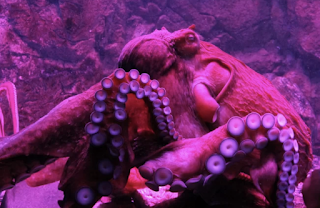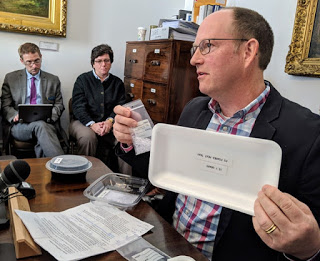Shark finning, Plastic bans around the globe, Plastic discovered in the deepest part of ocean, 1 Million species facing extinction, Ocean plastics endanger bacteria necessary for life, Antarctic ice thinning and much more…
1. After Disappearing For 30 Years, A Certain Shark Is Back In California
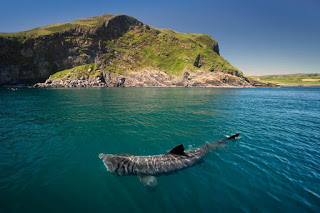 Yes, this is one of those “fish swimming in the ocean” posts. But in my defense, at least it’s a really cool and really big fish. The Basking Shark (Cetorhinus maximus) has made a grand entrance back to Californian waters after a 30-year absence. Capable of reaching 20-26 feet (6–8 m), these large animals are known to scare beachgoers whenever they see their large dorsal fin. Ryan Lawler was the one to spot the massive dorsal fin in the distance, slicing through the water, and assumed it was a great white shark. It wasn’t until his boat got closer that he saw the gaping mouth and the very un-great-white-shark-like face.
Yes, this is one of those “fish swimming in the ocean” posts. But in my defense, at least it’s a really cool and really big fish. The Basking Shark (Cetorhinus maximus) has made a grand entrance back to Californian waters after a 30-year absence. Capable of reaching 20-26 feet (6–8 m), these large animals are known to scare beachgoers whenever they see their large dorsal fin. Ryan Lawler was the one to spot the massive dorsal fin in the distance, slicing through the water, and assumed it was a great white shark. It wasn’t until his boat got closer that he saw the gaping mouth and the very un-great-white-shark-like face.
The federal Liberals are looking to incorporate elements of Senate public bills banning shark finning and phasing out captivity of some marine mammals into government fisheries legislation currently before the Upper Chamber. Sen. Peter Harder, the government’s representative in the Senate, has moved 28 amendments to Bill C-68 as it goes through clause-by-clause consideration in the Senate fisheries and oceans committee this week. Among other changes, the amendments incorporate provisions in Bill S-238 banning the practice of shark finning and the import and export of shark fins, as the government worries that bill will not pass into law before Parliament rises for the next election.
Mexico City lawmakers have passed a ban on plastic bags, utensils and other disposable plastic items to take effect at the end of 2020. The city of more than 9 million residents – with another 11 million in surrounding areas – is known for vibrant street food and carry-out culture. It would give businesses more than a year to make the switch to biodegradable products. The ban on plastic bags would take effect in December 2020, followed by straws, utensils, balloons and other single-use items in January 2021.
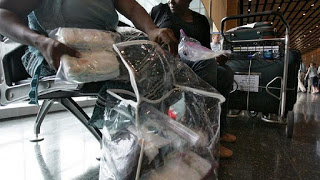
The Tanzanian government has officially announced a ban on the entry of all plastic carrier bags according to a press statement from the Vice President’s office. The May 16, 2019 statement titled: “Notice To Travelers Planning To Visit Tanzania,” said the government was going to set up a special desk at entry points to enforce the measure. The statement read in part: “The Government of Tanzania wishes to make an official note to travelers planning to travel to Tanzania that from 1st June 2019 all plastic carrier bags, regardless of their thickness will be prohibited from being imported, exported, manufactured, sold, stored, supplied and used in mainland Tanzania.”
———————————————-
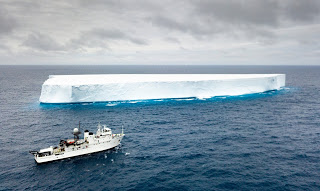 When explorer Victor Vescovo first set out to build a submarine that could reach the deepest corners of the ocean, he wasn’t necessarily thinking about discoveries at the bottom. The key motivation, he said, was to prove that his submarine could reach places that never been visited before. Then he started diving. On his journey to visit all five oceans, a mission called the Five Deeps Expedition, Vescovo discovered four new species, including a mysterious creature that resembles a bottom-dwelling jellyfish.
When explorer Victor Vescovo first set out to build a submarine that could reach the deepest corners of the ocean, he wasn’t necessarily thinking about discoveries at the bottom. The key motivation, he said, was to prove that his submarine could reach places that never been visited before. Then he started diving. On his journey to visit all five oceans, a mission called the Five Deeps Expedition, Vescovo discovered four new species, including a mysterious creature that resembles a bottom-dwelling jellyfish.
6. One Million Species Threatened with Extinction because of Humans
7. Octopuses May Go Blind As Climate Change Sucks Oxygen Out of the Ocean
Turning light particles into visual information is hard work, and your body relies on oxygen to get the job done. This is true whether you walk the land on two limbs or swim through the sea with eight. In fact, according to a recent study in the Journal of Experimental Biology, the amount of oxygen available to marine invertebrates like squids, crabs, and octopuses may be far more important to their vision than previously thought. In the study, published online April 24, researchers saw a significant drop in retinal activity in four species of marine larvae (two crabs, an octopus, and a squid) when the animals were exposed to reduced-oxygen environments for as little as 30 minutes.
8. $2.5 Trillion Breathing Problem? Ocean Plastic Endangers Bacteria that Create Oxygen Necessary for Life
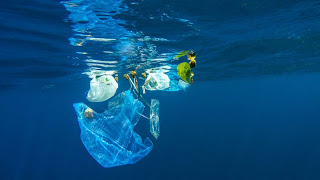
It’s already been cast as an economic villain, to the tune of $2.5 trillion, disrupting “almost all marine ecosystem services” and suffocating every industry it touches. Now, plastic pollution in oceans could actually be suffocating the planet – by harming the tiny microorganisms that are “thought to be responsible for up to 10 percent of … total global oxygen production.” According to a new study in the scientific journal Communications Biology, the chemicals that leak from plastic waste floating around in the ocean may stop the bacteria known as Prochlorococcus from producing oxygen.
9. Significant Plastic Accumulation on the Cocos (Keeling) Islands, Australia
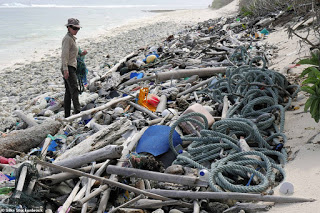 For over 60 years, our oceans have been a reservoir for exponentially increasing amounts of plastic waste. Plastic has been documented at all levels of the marine food web, from the deepest oceanic trenches to the most far-flung beaches. Here, we present data on the presence of significant quantities of plastic on the remote Cocos (Keeling) Island group, located 2,100 km off the northwest coast of Australia. From our comprehensive surveys of debris on the beach surface, buried, and beach-back vegetation, we estimate there are 414 million anthropogenic debris items, weighing 238 tonnes, currently deposited on the Cocos (Keeling) Island group.
For over 60 years, our oceans have been a reservoir for exponentially increasing amounts of plastic waste. Plastic has been documented at all levels of the marine food web, from the deepest oceanic trenches to the most far-flung beaches. Here, we present data on the presence of significant quantities of plastic on the remote Cocos (Keeling) Island group, located 2,100 km off the northwest coast of Australia. From our comprehensive surveys of debris on the beach surface, buried, and beach-back vegetation, we estimate there are 414 million anthropogenic debris items, weighing 238 tonnes, currently deposited on the Cocos (Keeling) Island group.
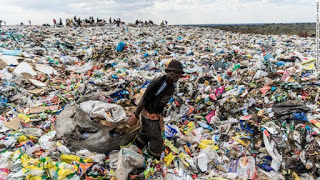 The governments of 187 countries have agreed to control the movement of plastic waste between national borders, in an effort to curb the world’s plastic crisis — but the United States was not among them. Nations agreed to add plastic to the Basel Convention, a treaty that regulates movement of hazardous materials from one country to another, in order to combat the dangerous effects of plastic pollution around the world. The pact was approved at the end of a two-week meeting of UN-backed conventions in Geneva, Switzerland. But the US was not involved in the decision-making process, as it is one of just two countries that have not ratified the agreement.
The governments of 187 countries have agreed to control the movement of plastic waste between national borders, in an effort to curb the world’s plastic crisis — but the United States was not among them. Nations agreed to add plastic to the Basel Convention, a treaty that regulates movement of hazardous materials from one country to another, in order to combat the dangerous effects of plastic pollution around the world. The pact was approved at the end of a two-week meeting of UN-backed conventions in Geneva, Switzerland. But the US was not involved in the decision-making process, as it is one of just two countries that have not ratified the agreement.

Ice losses are rapidly spreading deep into the interior of the Antarctic, new analysis of satellite data shows. The warming of the Southern Ocean is resulting in glaciers sliding into the sea increasingly rapidly, with ice now being lost five times faster than in the 1990s. The West Antarctic ice sheet was stable in 1992 but up to a quarter of its expanse is now thinning. More than 100 meters of ice thickness has been lost in the worst-hit places. A complete loss of the West Antarctic ice sheet would drive global sea levels up by about five meters, drowning coastal cities around the world. The current losses are doubling every decade, the scientists said, and sea level rise are now running at the extreme end of projections made just a few years ago.
 TV presenter Chris Packham has received his CBE medal from the Prince of Wales in a ceremony at Buckingham Palace. The wildlife campaigner has been the focus of death threats and harassment in recent weeks over his legal action to restrict the shooting of wild birds. He was appointed a CBE in the New Year’s Honours for his services to nature conservation. Others receiving honors include knighted tennis champion Sir Andy Murray and author Sir Philip Pullman. Mr. Packham, who lives in the New Forest, previously described the honor as a “silent thanks” for the animals he had defended.
TV presenter Chris Packham has received his CBE medal from the Prince of Wales in a ceremony at Buckingham Palace. The wildlife campaigner has been the focus of death threats and harassment in recent weeks over his legal action to restrict the shooting of wild birds. He was appointed a CBE in the New Year’s Honours for his services to nature conservation. Others receiving honors include knighted tennis champion Sir Andy Murray and author Sir Philip Pullman. Mr. Packham, who lives in the New Forest, previously described the honor as a “silent thanks” for the animals he had defended.
After a lengthy debate Thursday, the Vermont House gave final approval Friday morning to legislation that would ban single-use plastic grocery bags and styrofoam carryout containers. It would also require restaurants and other establishments to provide plastic straws only by customer request. The bill, S.113, passed on a voice vote, but an earlier procedural vote of 120 to 24 showed that it had broad support in the chamber. Thursday’s debate was dominated by House Republicans, who alternated between criticizing the legislation and asking highly specific hypothetical questions about its implications for Vermonters and local businesses.
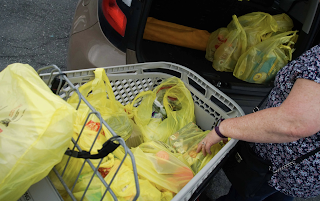 Delaware is one step closer to banning most plastic shopping bags by 2021. The state House on Tuesday passed a bill by Rep. Gerald Brady, D-Wilmington West, that would target the single-use bags commonly seen at supermarkets and convenience stores. The Senate has to give it similar approval before Gov. John Carney can sign the ban into law. The governor, who since the bill’s introduction has kicked off his anti-litter campaign, supports the ban. THE BAN: Delaware might be the next state to ban plastic shopping bags The House voted 33-7 for the ban on Tuesday. Some proponents argue that plastic shopping bags are recycled at low rates, leaving many to end up in the trash. They say it would keep the state, including its watersheds, clean. Supporters also hope it could reduce stormwater and trash management costs.
Delaware is one step closer to banning most plastic shopping bags by 2021. The state House on Tuesday passed a bill by Rep. Gerald Brady, D-Wilmington West, that would target the single-use bags commonly seen at supermarkets and convenience stores. The Senate has to give it similar approval before Gov. John Carney can sign the ban into law. The governor, who since the bill’s introduction has kicked off his anti-litter campaign, supports the ban. THE BAN: Delaware might be the next state to ban plastic shopping bags The House voted 33-7 for the ban on Tuesday. Some proponents argue that plastic shopping bags are recycled at low rates, leaving many to end up in the trash. They say it would keep the state, including its watersheds, clean. Supporters also hope it could reduce stormwater and trash management costs.
Read more from “Delaware Online”



